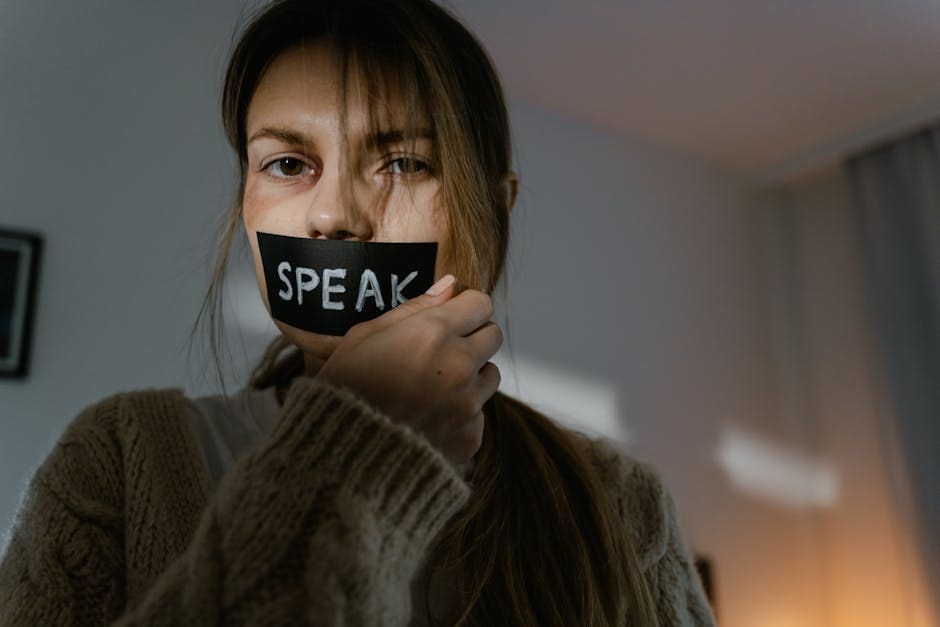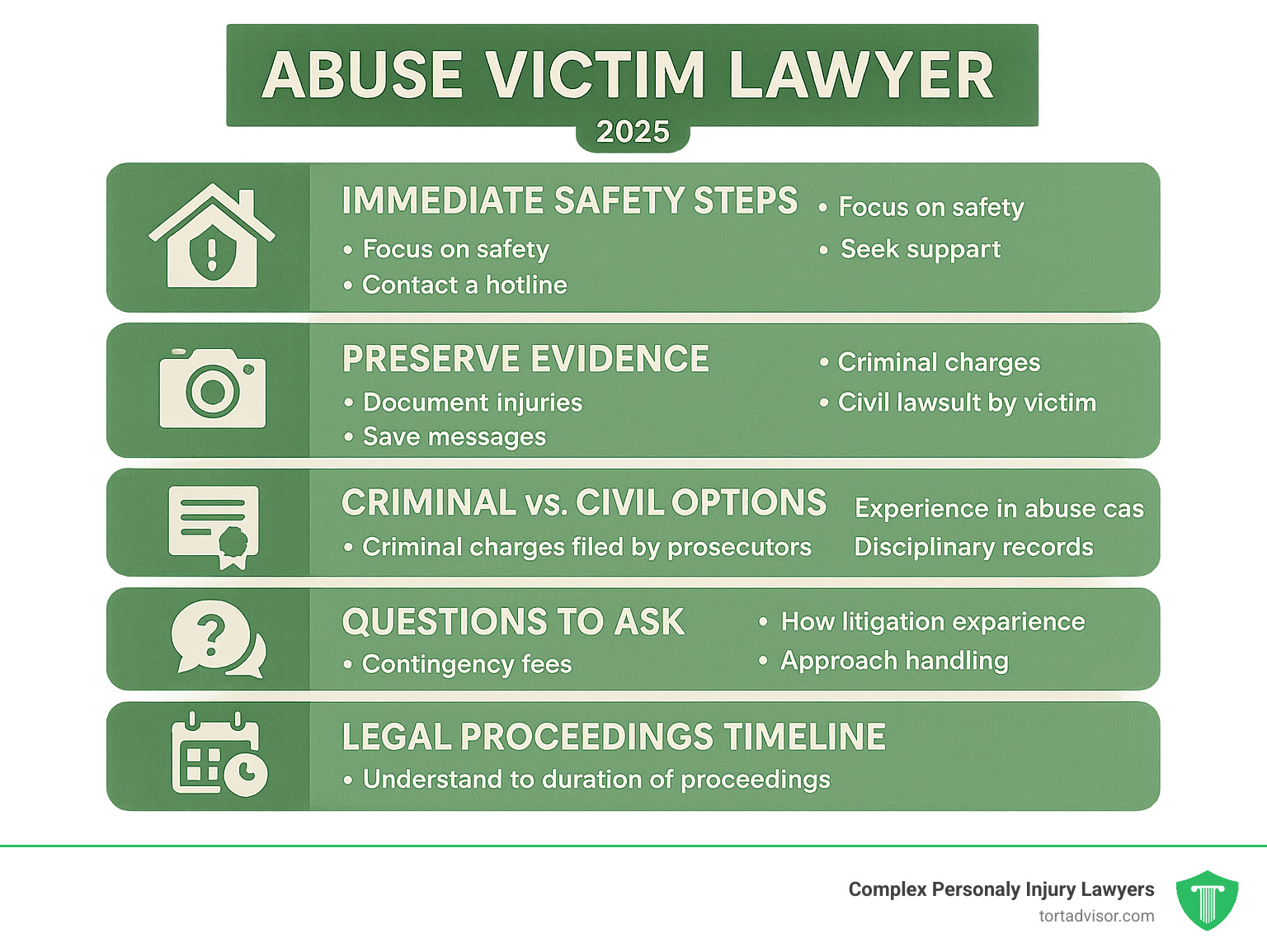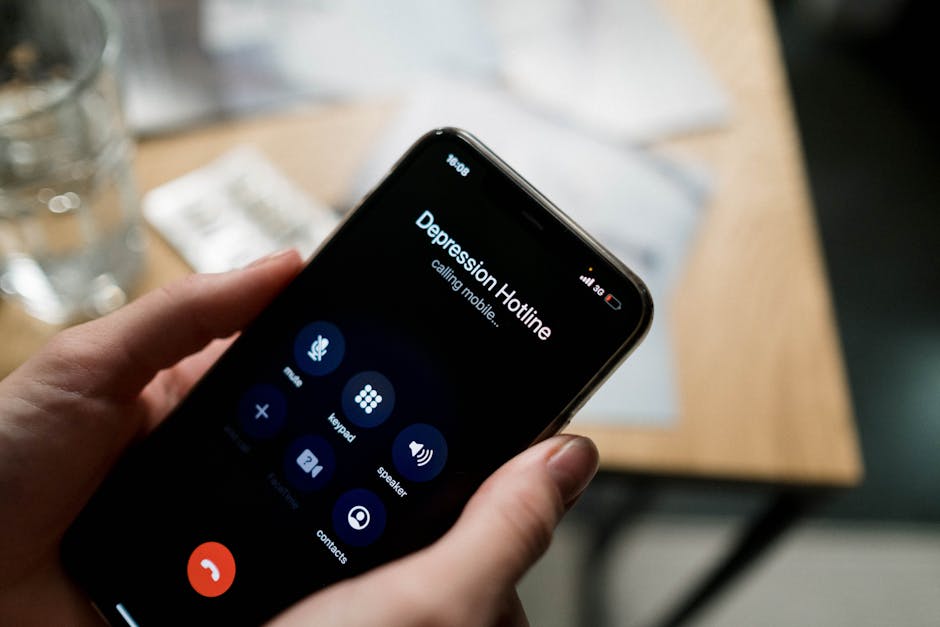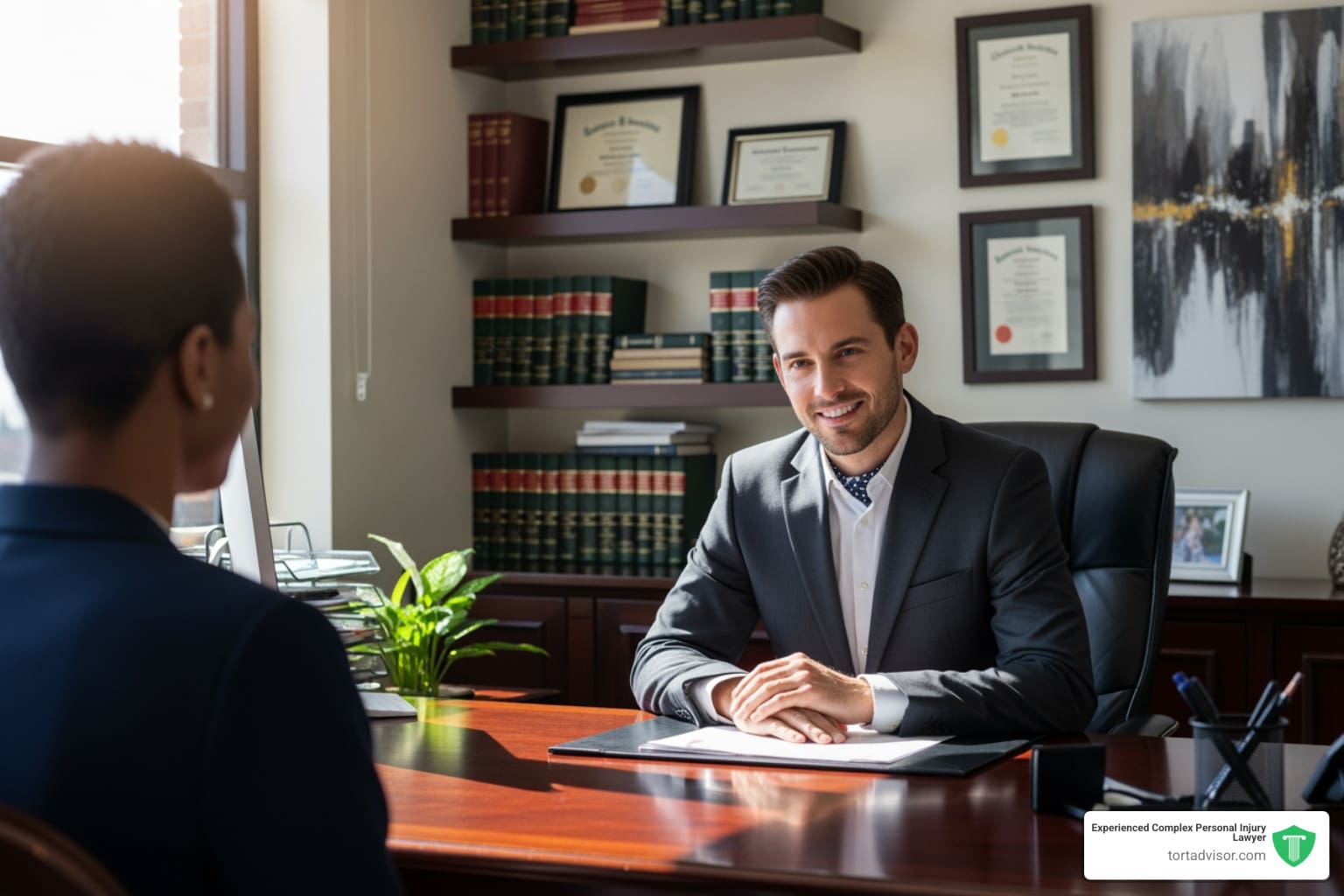


Why Finding the Right Legal Advocate Matters for Survivors
An Abuse victim lawyer specializes in representing survivors of domestic violence, sexual assault, and other forms of abuse. These attorneys provide crucial legal guidance and compassionate support, helping you steer both criminal and civil legal proceedings during an incredibly challenging time.
Key services include legal representation in civil lawsuits for financial compensation, preserving evidence, protecting you from re-traumatization, and holding institutions like schools and churches accountable. Most offer free consultations and work on a contingency fee basis, meaning there are no upfront costs.
The statistics are sobering: someone is sexually assaulted every 73 seconds in the United States. Survivors often face fear, shame, and confusion, and many don’t realize they have two paths to justice: the criminal system for punishment and the civil system for financial compensation to cover medical bills, lost wages, and emotional distress.
Recent legal changes, like Florida’s Donna’s Law, have evolved to better protect survivors by extending or eliminating time limits for filing lawsuits. Specialized legal networks are vital for helping survivors find the best representation for their unique situations.
Understanding Abuse and Your Immediate Next Steps
When you’ve experienced abuse, the aftermath can be overwhelming. Understanding what happened and knowing your immediate options can help you regain control. An abuse victim lawyer can guide you, but your safety comes first.
What Constitutes Domestic and Sexual Abuse?
Abuse takes many forms, and it’s not always physical. Domestic violence is a pattern of power and control. Physical abuse is any unwanted contact, like slapping or pushing, and doesn’t require visible injury to be a crime. Sexual abuse is any sexual act without consent; for minors, any sexual contact with an adult is a crime because a child cannot legally consent. Emotional and verbal abuse, such as constant criticism and threats, can be just as damaging. Financial abuse involves controlling your access to money, while stalking and cyberstalking are forms of repeated, unwanted attention that cause fear.
Feelings of fear, shame, and confusion are normal responses to trauma. The abuse is never your fault. Resources like WomensLaw.org offer plain-language legal information for survivors.
Immediate Steps for Your Safety and Case
Your safety is the top priority. If you are in danger, get to a safe place. Use a safe computer or phone if you’re worried about being monitored.
- Seek Medical Attention: It’s crucial to get a medical evaluation, even if you don’t feel seriously hurt. Medical staff can document injuries and collect evidence that may be vital later, even if you’re not ready to press charges.
- Preserve Evidence: If possible, avoid showering or changing clothes after an assault. If you must change, place the clothes in a paper bag. Take photos of any injuries.
- Document Everything: Save texts, emails, and voicemails related to the abuse. Write down what happened, including dates and times, while it’s fresh in your memory.
- Know Your Options: You can report the incident to the police to start a criminal investigation, but this is not required to file a civil lawsuit for compensation. These are two separate legal paths.
- Reach Out for Support: You are not alone. The National Domestic Violence Hotline (1-800-799-7233) and RAINN (Rape, Abuse & Incest National Network) offer 24/7 support. The Email Hotline from WomensLaw.org can also provide guidance.
Taking these steps takes courage. Focus on your safety first, and know that an abuse victim lawyer can explain your legal options without pressure.
Navigating the Legal System: Criminal vs. Civil Justice
Understanding your legal options is a key step toward reclaiming your power. In Florida and other states, survivors can pursue protection orders, criminal charges, and civil claims. It’s vital to know that you have two separate paths to justice and can pursue both simultaneously.
The Two Paths to Justice: Criminal and Civil Lawsuits
Many survivors don’t realize their options extend beyond reporting to the police. The criminal and civil systems serve different purposes.
- The Criminal Justice System: The state prosecutes the abuser to seek punishment like jail time or fines. The prosecutor decides whether to file charges, and the standard of proof is very high: “beyond a reasonable doubt.” A conviction provides validation but rarely offers financial help to the survivor.
- The Civil Justice System: You, with your abuse victim lawyer, file a lawsuit against the abuser and any responsible third parties. The goal is financial compensation to help you rebuild your life. The standard of proof is lower: “preponderance of the evidence,” meaning it’s more likely than not that the abuse occurred. With only 5 out of 1,000 abusers ever being incarcerated, a civil lawsuit is often a more realistic path to accountability.
Potential Damages and Compensation in a Civil Case
A civil lawsuit is about holding abusers financially accountable and getting the resources you need to heal. You can recover compensatory damages for tangible and intangible losses. This includes medical bills, therapy costs, lost wages, and diminished earning capacity. It also covers non-economic damages like emotional distress, mental anguish, and pain and suffering.
In cases where an abuser’s actions were especially malicious or reckless, courts may also award punitive damages. These are intended to punish the wrongdoer and deter similar conduct in the future. An experienced abuse victim lawyer will carefully document all damages to ensure you are fully compensated.
Florida’s Statute of Limitations for Abuse Claims
The statute of limitations, or the deadline for filing a lawsuit, is complex in abuse cases. Florida law has changed to give survivors more time.
For adult survivors of childhood sexual abuse, the deadline is generally seven years from turning 18. However, a “findy rule” provides two years from when you connect your injuries to the abuse. The most significant change is Florida’s Donna’s Law, which eliminated the statute of limitations entirely for child sexual abuse claims. This means a survivor can bring a claim at any point in their life.
Because these time limits are tricky, it’s crucial to consult an abuse victim lawyer who can review your case and determine your specific deadline.
The Crucial Role of an Abuse Victim Lawyer
Navigating the legal system after abuse can be intimidating. An Abuse victim lawyer is more than a legal representative; they are a guide and a shield, providing a pathway to justice and healing.
What Does an Abuse Victim Lawyer Do for You?
An Abuse victim lawyer handles the legal burdens so you can focus on recovery. They conduct a thorough case evaluation, explain your options in plain English, and manage the entire legal process. This includes gathering critical evidence like medical records and witness statements, filing all necessary legal documents on time, and skillfully negotiating settlements to secure maximum compensation.
If a case goes to trial, your lawyer represents you with compassion and strength. As attorney Natalie Weatherford explains, lawyers in this field act as a “protector,” shielding clients from aggressive defense tactics that can re-traumatize survivors. Throughout the process, they ensure you are empowered to make informed decisions about your case.
A Compassionate Approach to Sensitive Cases
The best Abuse victim lawyers understand that legal proceedings can be re-traumatizing. They prioritize creating a safe, non-judgmental space where you feel heard and respected. Building trust is essential, and they do so with patience and open communication, never pressuring you. This victim-centered approach is designed to minimize additional trauma while building the strongest possible case. Their role extends beyond legal victories to empowering survivors, helping them reclaim their personal agency and connecting them with healing resources like therapists and support groups.
Seeking Justice for Child Sexual Abuse
Cases involving child sexual abuse demand highly specialized knowledge and sensitivity. An Abuse victim lawyer must steer a system designed to protect children while ensuring their best interests are paramount. New laws like Maryland’s Child Victims Act of 2023 and Florida’s Donna’s Law have removed or extended statutes of limitations, opening doors for survivors to seek justice decades later.
These cases often involve holding institutions accountable for negligent hiring or covering up abuse. A skilled attorney investigates not only the perpetrator but also the systemic failures that allowed the abuse to occur, connecting families with vital support resources along the way.
Holding Institutions Accountable for Abuse
Often, abuse is enabled by the failures of powerful institutions like schools, churches, and other organizations. An Abuse victim lawyer knows how to hold these entities accountable when they fail to protect the people in their care or actively cover up wrongdoing.
When Organizations and Third Parties Are Liable
Institutions have a legal duty of care to protect those they serve. They can be held liable for negligent hiring (failing to run background checks), negligent supervision (failing to monitor employees), or engaging in cover-ups. These systemic failures create environments where abuse can occur repeatedly.
An Abuse victim lawyer can help you hold various organizations accountable, including:
- Schools and universities where teachers, coaches, or staff abuse students.
- Churches and religious organizations that hide or enable clergy abuse.
- Foster care systems that fail to screen or monitor foster parents properly.
- Youth organizations like sports leagues where leaders abuse their positions of trust.
- Hospitals and medical facilities where doctors or therapists harm patients.
- Workplaces that fail to prevent sexual harassment and abuse.
- Rideshare companies that fail to ensure passenger safety.
Types of Institutional Abuse Cases
Institutional abuse cases often involve a profound betrayal of trust. This includes abuse by teachers, coaches, clergy members, doctors, and therapists who exploit their positions of authority. Abuse in foster care is particularly tragic, as it harms children who are already vulnerable. In many of these situations, the institution’s liability stems from its failure to act once it became aware of the abuse. An experienced Abuse victim lawyer can uncover these failures, forcing organizations to change their practices and prevent future harm.
How to Find and Choose the Right Abuse Victim Lawyer
Choosing the right Abuse victim lawyer is a critical step. You need an advocate with the right expertise and a compassionate understanding of what survivors endure.
Where to Find Legal Representation and Support
Several reliable resources can help you find a qualified attorney. The National Crime Victim Bar Association connects survivors with lawyers specializing in these cases. Your state and local bar associations also offer referral services. At Complex Personal Injury Lawyers, our nationwide network connects clients with top-rated specialty attorneys in states from Alabama to Florida to California.
Referrals from therapists or support groups are also valuable, as are organizations like RAINN and WomensLaw.org. While online directories can be a starting point, always verify an attorney’s credentials and focus on finding someone who regularly handles abuse cases.
Key Questions to Ask a Potential Abuse Victim Lawyer
Your initial consultation, which is often free, is your chance to vet a potential lawyer. Be prepared with these questions:
- What percentage of your practice is dedicated to abuse cases? You want a specialist, not a generalist.
- What is your experience with cases like mine? Ask about their track record with similar situations, especially those involving institutional liability.
- How will you communicate with me and keep me updated? Clear communication is vital for your peace of mind.
- What is your fee structure? Most work on a contingency fee basis, meaning you pay nothing unless they win. Confirm this arrangement.
- How do you protect clients from re-traumatization during litigation? A good lawyer will have specific strategies to minimize your emotional burden.
- What is your trial experience? While most cases settle, you need an attorney who is a credible threat in the courtroom.
At Complex Personal Injury Lawyers, we connect clients with attorneys who have proven results and provide both empathetic support and effective representation.
Frequently Asked Questions about Abuse Lawsuits
It’s natural to have questions when considering legal action. Here are answers to some common concerns.
Do I have to report the abuse to the police to file a civil lawsuit?
No. You absolutely do not need to file a police report or have criminal charges pressed to pursue a civil lawsuit. The criminal and civil justice systems are separate. The criminal system seeks punishment, while the civil system is focused on financial compensation for your suffering. An Abuse victim lawyer can pursue your civil claim regardless of any criminal proceedings.
How much does it cost to hire an abuse victim lawyer?
Most abuse victim lawyers work on a contingency fee basis, which means you pay nothing upfront. Your lawyer’s fee is a percentage of the settlement or court award they obtain for you. If they don’t win your case, you owe no attorney fees. This system allows every survivor to access high-quality legal help without financial risk.
Can I sue if the abuse happened a long time ago?
Possibly, yes. Many survivors can file lawsuits even decades after the abuse. While states have time limits called “statutes of limitations,” many have recently passed laws to extend these deadlines or create “look-back windows” for older claims, especially for child sexual abuse.
For example, Florida’s Donna’s Law completely removed the time limit for child sexual abuse claims. Because these rules are complex, it is always worth speaking with an Abuse victim lawyer. Many survivors are surprised to learn they still have a valid claim.
Conclusion: Taking the First Step Towards Justice and Healing
Your story matters, and you have the right to seek justice. The path forward can feel overwhelming, but you do not have to walk it alone. You have the right to hold abusers accountable and pursue compensation to help you on your road to recovery. Reclaiming your power and your voice is possible.
Finding the right Abuse victim lawyer is about partnering with an advocate who will fight for you while treating you with the compassion you deserve. Taking the first step to contact a lawyer takes incredible courage, but it is a victory over fear.
Complex Personal Injury Lawyers understands this. We have built a nationwide network of skilled and compassionate attorneys who specialize in abuse cases. From Florida to California, our abuse victim lawyers have dedicated their careers to fighting for survivors. They are specialists with proven results in holding both individuals and institutions accountable.
They know how to steer complex laws and, most importantly, how to protect you from re-traumatization during the legal process. Whether the abuse was recent or decades ago, legal options may be available.
The consultation is free, and representation costs nothing upfront. The potential for justice and the resources to heal are priceless.
Take control of your future today. Explore your legal options and take the first step toward the justice and healing you deserve. Find more information about your rights at tortadvisor.com.
Free Confidential Case Evaluation
Complete the short form below to get an immediate FREE case review with an expert in your specific claim. Don't wait, your case could be time sensitive to file a claim.
Related Posts
Did a North Dakota product cause harm? Understand product liability, your rights, and how to take action for defects.
Get justice for clergy abuse. Find an expert Priest abuse lawyer to navigate complex laws and hold institutions accountable.
Diagnosed with meningioma after Depo-Provera? Understand potential Depo-Provera lawsuit settlements, risks, & how to claim compensation.
Uncover the truth about uber sexual assault cases. Learn about the alarming scale, Uber's accountability, and legal options for justice.
Facing wildfire losses? Discover the best wildfire lawsuit attorneys in California to fight for your full recovery and justice.
Exposed to Roundup & diagnosed with NHL? Discover how to sue Monsanto, understand eligibility, & seek compensation. Your guide to justice.









